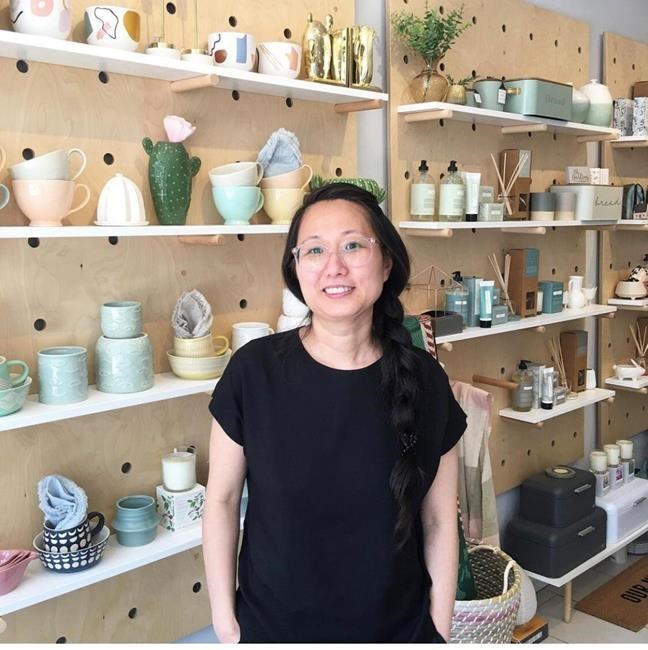TORONTO — Trinh Ngo misses the days when her two Juxtapose gift and home goods stores would be teeming with customers sniffing candles and testing hand lotions.
The Toronto stores, which are temporarily closed while the city and three nearby regions remain under stay-at-home orders from the province, have been operating through curbside pickup for months and sometimes only eke out $50 a day in sales. Even more stressful for Ngo is the anxiety of not knowing what's next.
"We might open. We might not. It is very up in the air and everything is possible," said Ngo.
"If this keeps going I don't know how long I'll survive, but I will hold on for as long as I can until I have to close because it's my baby."
Non-essential retailers in Toronto and neighbouring Peel Region have been restricted to curbside pickup for more than 12 weeks, having moved into Ontario's "grey" or lockdown stage a month before the entire province was placed under a stay-at-home advisory on Dec. 26.
Those restrictions are now lifted in the majority of areas, but Ontario Premier Doug Ford said Friday that Toronto and Peel will remain in lockdown for at least two more weeks.
Even once lockdown ends, that won't end the uncertainty small businesses face since restrictions may be reimposed if COVID-19 case counts climb.
Small business owners say that means reopenings might be short-lived and the unpredictability they've lived with for close to a year now won't go away any time soon.
"I'm constantly just scrambling, because are we going to open next week or are we not?" said Ngo.
Most of the products Juxtapose sells are impulse buys or items you want to touch before purchasing, so reopening would boosts sales, but is a lot of effort to have to repeat over and over again, she said.
Staff have to be scheduled, the store must be rearranged to allow for additional safety measures and Ngo will have to move products she previously shifted to other parts of her shops to make curbside pickup easier.
Doing those tasks on a moment's notice is tough, she said.
Sonya D’Cunha, the owner of Helen and Hildegard herbal apothecary and artisanal beauty boutique in Toronto, agreed.
She's had to get customers to switch back and forth between shopping online, curbside pickup and in-person numerous times during the pandemic.
While she longs to have people in her store again and sales back to normal, she's tired of the constant restriction changes and shifts and is contemplating staying closed for in-store shopping until the city really has a handle on the virus.
"It doesn't seem like the climate in which the government is reopening us in is a better one than we were locked down originally ...We may maintain a locked door," she said.
"I'm going to play it cautiously and not necessarily change the way we're doing things right now because, in all likelihood, there will be another lockdown."
But not every small business can afford her approach.
At least 58,000 of them have already closed during the pandemic, said the Canadian Federation of Independent Businesses, which represents at least 110,000 small businesses across the country.
It estimates 181,000 more small businesses are at risk of closing before the end of the pandemic, putting 2.4 million jobs at risk.
However, small business owners are split on what should be done about restrictions.
About 43 per cent of the 4,701 small business owners CFIB surveyed in January want restrictions to be loosened to allow for reopening, 22 per cent think they need strengthening to protect people and 26 per cent believe public health officials have struck the right balance with their current measures.
Whenever it is permitted, Alyssa Kerbel won't be rushing to invite customers back into her Toronto-based children's apparel store Mini Mioche
"It is just not really worth it, unless I feel like things are back to where they were in summer," she said, referencing a time when the city's case numbers were low and stores and restaurants were open again.
"I don't really want to do the back and forth between open and not open. I'd rather just ride it out."
Kerbel shuttered Mini Mioche locations she had in Los Angeles and Toronto's Distillery District during the pandemic. She has one showroom left, but it's temporary closed, so for now, she's focusing entirely on e-commerce, which has been doing well.
She knows many companies are hanging on by a thread and aren't as well-positioned for a pandemic as Mini Mioche. She wishes there was more long-term clarity for them.
"I'm not waiting day by day to see whether or not we can reopen ... but it seems very ambiguous and vague and there doesn't seem to be a lot of information provided," she said.
"It's really difficult for many, many retailers. I really feel for people."
This report by The Canadian Press was first published Feb. 19, 2021.
Tara Deschamps, The Canadian Press



